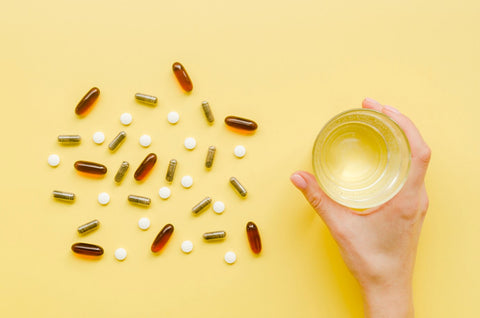Anxiety, depression and fatigue are some of the physical and sociocultural factors that influence the sexual appetite of women during menopause. Sexuality during menopause has been a taboo subject , which has meant that for years, women during this period who have had discomfort, dryness or lack of desire have continued to have unsatisfactory relationships without being able to discuss it with their gynaecologist or partner.
Sexual desire
Apart from the typical symptoms of menopause such as irritability, hot flashes, sleep disturbances, headaches and dizziness, it is possible that during this stage we feel less secure, that we have communication problems with our partner, that we are more tired; to this we add the physical changes: the abdomen usually increases, we lose our waist, we gain a few kilos… together with other symptoms more associated with sexuality such as vaginal dryness; changes in the appearance of the vagina, vulva and labia; atrophy of the muscles between the vagina and the perineum, that is, of the pelvic floor, and greater dryness in the skin and hair.
These changes in appearance lead some women to feel less attractive, which, combined with the physical changes in the sexual organs and the sociocultural connotations that menopause has in part of the world, can cause some women's sexual desire to decrease during this period.
Problems that affect sex at this stage
In addition to the reduction in estrogen levels, there are many other factors that can affect sexual desire:
1- Menopausal symptoms : during these years there are many annoying symptoms: irritability, anxiety, hot flashes, night sweats, sleeping problems, headaches, vertigo, dizziness, nausea, fatigue, etc., which do not exactly help sexual relations.
2- Vaginal dryness: estrogens maintain blood flow, sweating and glandular secretion, responsible for vaginal lubrication, so when estrogen levels decrease, significant vaginal dryness occurs, causing pain during penetration. If sexual intercourse is avoided, the vagina may become shorter and narrower, increasing pain during penetration.
3- Genitourinary problems : the vaginal tissue becomes thinner and less elastic, it becomes more fragile and can crack and bleed briefly, so it is more common to suffer from vaginal or urinary infections that also affect sexual relations as they usually cause pain during penetration.
4- Psychological changes : all the emotional changes of this stage affect sexual life and relationships. Emotional or personal changes may also be caused by problems other than menopause, but which are common in the fifties.
5- Problems reaching orgasm : hormonal changes during menopause mean that women need more time to reach the arousal phase and to lubricate the vagina. Furthermore, the loss of muscle tone in the pelvic floor, together with vaginal dryness, mean that the contractions that occur when reaching orgasm are less intense and longer lasting, which makes them less satisfying.
What can you do to have a fulfilling sexuality during menopause?
We list some things that can help you find a new sexuality at this stage of your life.
Having a full sexuality is not over yet , but sometimes a period of adaptation is needed due to the number of changes that are occurring in your body.
1- Talk to your gynecologist
During check-ups, this is one of the topics to discuss if you are worried. Although society may seem to have changed a lot, it is still a taboo subject, even when it comes to discussing it with a healthcare professional. Talk openly about your concerns and doubts about this topic.
2- Use treatments for vaginal dryness and lack of lubrication
The decrease in estrogen causes changes in the vulva and vagina that lead to greater dryness and a decrease in lubrication during sexual relations. This can cause pain during penetration and discomfort during sexual relations. If this is your case, we recommend that you use moisturizers daily and lubricants during sexual relations.
3- Do pelvic floor exercises
A weak and poorly exercised pelvic floor can result in discomfort during penetration and longer delays to orgasm, which is why it has been shown that performing pelvic floor exercises can improve satisfaction during sexual relations.
4- Talk to your partner
Talking to your partner about the changes you are experiencing is essential for you to continue having a fulfilling sexual life. It is of utmost importance for your partner to understand the process you are going through so that he or she can help you move through this new stage . Remember that the brain is the most important sexual organ, so you can work on your desire for sex with a different motivation such as new sex toys, sexy lingerie, adult movies, erotic fantasies or a pre-sex massage. Use your imagination!
5- Avoid using products that irritate your vagina , such as certain soaps or intimate deodorants, which can cause irritation.
6- Accept this new stage
It is important to accept the changes that are taking place and find a way to live sexuality in a different way.
Each woman, each couple, will discover their own, and this will lead to a sexuality that may be different from the one you had 20 years ago... but that can be equally satisfying.
Hormonal therapy
Menopausal hormone therapy based on estrogens or derivatives may often be recommended during menopause for the treatment of genitourinary syndrome (a broad concept that includes vaginal, vulvar and urinary tract symptoms). Since most of the symptoms that occur during this stage are related to a decrease in blood levels of estrogens, the vagina being one of the organs with the highest number of estrogen receptors. The local application of estrogens in the form of vaginal rings or suppositories can alleviate and improve symptoms.
Certain hormonal medications such as prasterone , which is the only treatment that exerts estrogenic and androgenic activity in all layers of the vagina, also improves sexual function.
Another option would be the use of Ospemifene, the first non-estrogenic orally administered drug approved for the treatment of genitourinary syndrome.
Your doctor can help you understand the risks and benefits of each of these forms.
Lifestyle
Even small healthy lifestyle changes can make a big difference in your sex drive:
- Exercise. Regular aerobic exercise and muscle strengthening can increase strength, improve your physical appearance, boost your mood and increase your libido.
- Reduce stress . Finding effective ways to deal with work, daily, and financial stress can improve sexual desire.
- Quit bad habits . Tobacco, illegal drugs, and excessive alcohol can dampen your sex drive. Quitting these bad habits can help revive your sex drive and improve your overall health.
- Healthy diet : A healthy diet based on plant foods, healthy fats and proteins should be the priority, in addition to increasing the consumption of foods rich in phytoestrogens (isoflavones) such as some legumes, whole grains and nuts. These components have a structure similar to estrogens and could help relieve symptoms.
Natural supplements
A healthy and balanced diet , rich in all the necessary nutrients, should be maintained throughout life, however, this should be even more important during all stages of menopause. In addition, you can resort to natural supplements that will help counteract hormonal imbalance.
At Madequa we have the natural supplements you need at this stage and we offer you comprehensive support with three supplement packs for premenopause, perimenopause and postmenopause. Each one is designed to cover the specific needs of each phase, relieving symptoms and promoting the overall well-being of the body during this period of change.
References
Navarro M.ªC, Losa F, Beltrán E, Ortega M.ªT, Carretero M.ªE, Cañigueral S, Bachiller I, Vila R, Alonso M.ªJ, López-Larramendi JL, Allué J, Martín M, Cornellana M.ªJ , Mendoza N, Castelo-Branco, C. Natural products for mature women, MenoGuía AEEM. First edition 2022.
Juan Enrique Blümel M. 1 , Lorena Binfa E. a , Paulina Cataldo A. a Alejandra Carrasco V. a , Humberto Izaguirre L. 1 , Salvador Sarrá C. . FEMALE SEXUAL FUNCTION INDEX: A TEST TO EVALUATE WOMEN'S SEXUALITY. Rev Chil Obstet Ginecol 2004; 69(2): 118-125 Doi.org/10.4067/s0717-75262004000200006
López-Olmos, J. Sexuality after menopause: influence of hormone replacement therapy on women's dysfunctions. Clinical and Research in Gynecology and Obstetrics. Elsevier 2003; 30(7), 212–221. Doi.org/10.1016/s0210-573x(03)77263-3
Nasser, BZ, José, U.M., Valbuena, G., Alfi, C.B., & Estefany, A.Q. Effects of hormone replacement therapy on sexual function in women with natural or surgical menopause. Rev Obstet Ginecol Venez 2014; 74 (3)
AEEM-SEGO position statement on menopausal hormone therapy. Prog Obstet Ginecol 2018;61(3):232-236.
Maria Jose Maroto. Natural supplements to relieve menopausal symptoms. Top Doctors. 2019.




Comments (0)
There are no comments for this article. Be the first one to leave a message!